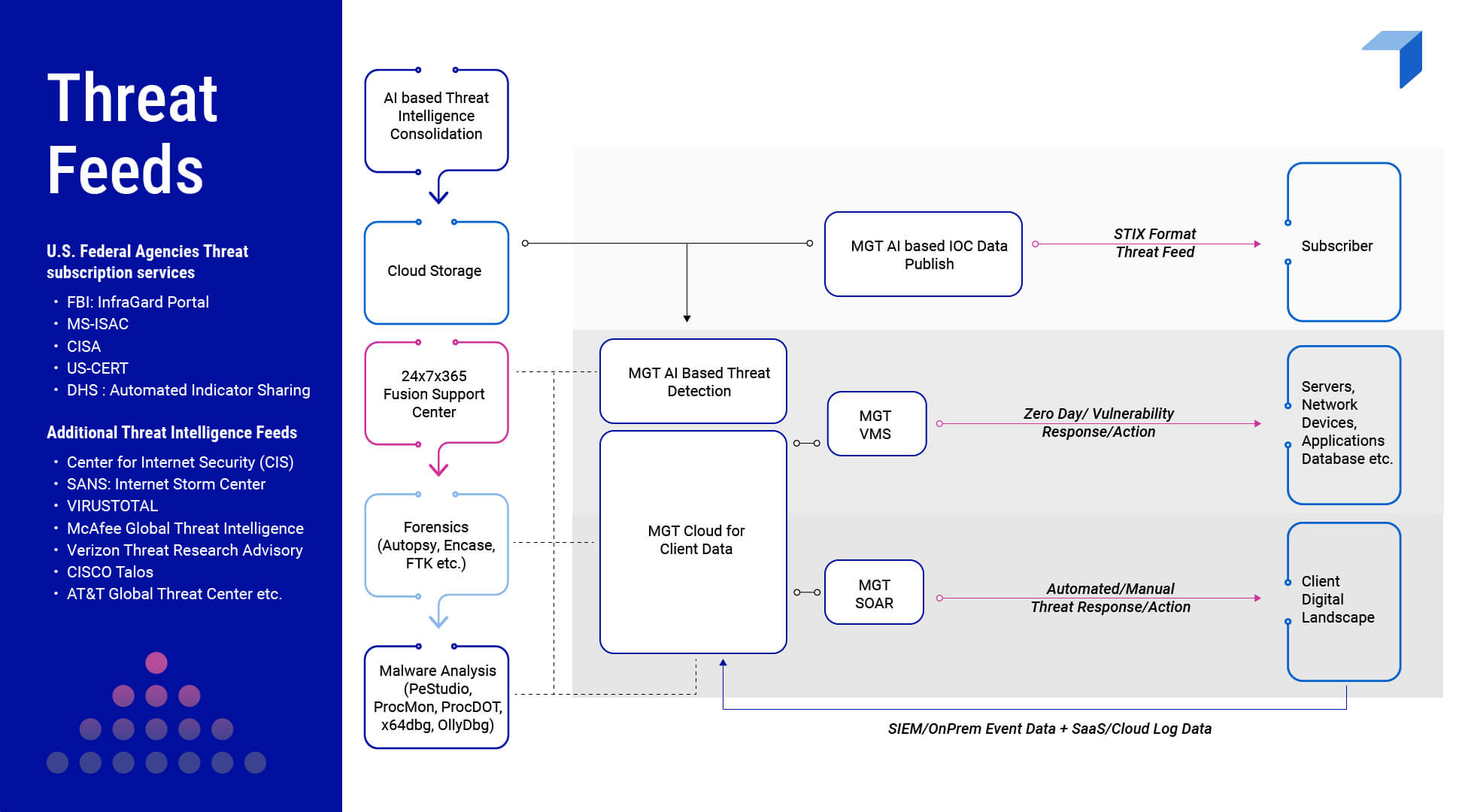MGT Cyber Fusion Center
We help protect educational institutions, government agencies, public/private infrastructure, and commercial enterprises.

Artificial Intelligence (AI) plays a pivotal role in enhancing the capabilities of MGT Technology's Cyber Fusion Center.
MGT leverages AI at its national Cyber Fusion Center, serving clients nationally for advanced capabilities of cyber threat detection, prevention, and response.
MGT's Cyber Fusion Center
Top 10 AI Features
MGT Cyber Fusion powered by AI is designed to process and analyze threat data in real time from various threat intelligence sources to act as a single source of truth through the collaborative and streamlined communication of tactical cyber threat intelligence, relevant Indicators of Compromise (IOC), and analyze potential threats/risks before the impact.
MGT-powered AI algorithms analyze large volumes of data in real-time to detect patterns indicative of cyber threats. This includes identifying anomalies in user behavior, analytics behavior, network traffic, and system logs that could indicate malicious activity.
MGT Cyber Fusion analyzes historical data to predict future cyber threats and vulnerabilities. By identifying trends and patterns, MGT’s response center helps clients proactively mitigate risks before they materialize into security incidents.
MGT CF leverages machine learning to study normal patterns of behavior for users, devices, and networks, enabling them to detect deviations from these patterns that may indicate a security breach or insider threat.
MGT Cyber Fusion Support Center automates responses to security incidents by triggering predefined actions based on predefined rules and machine learning algorithms. This includes quarantining infected devices, blocking suspicious network traffic, or alerting security personnel.
MGT Cyber Fusion Center as part of VMS utilizes advanced scripts to prioritize and remediate vulnerabilities based on their severity and potential impact on the client’s systems. This helps clients focus on addressing the most critical issues first. AI-powered predictive analytics can forecast the likelihood of future exploitation for unpatched vulnerabilities so clients can proactively mitigate threats.
MGT Cyber Fusion Center includes advanced malware detection techniques that go beyond signature-based approaches. Machine learning algorithms analyze file attributes and behaviors to identify previously unseen malware variants.
MGT security orchestration and automation functions are key to streamlining and automating various security processes, such as incident response workflows, threat hunting, and policy enforcement.
MGT Cyber Fusion solution includes AI&ML to detect and mitigate attacks against machine learning models themselves, ensuring the reliability and effectiveness of AI-based security systems.
MGT Cyber Fusion utilizes AI to help automate various aspects of incident response and investigation including evidence collection, analysis and reconstruction of the incident in a sandbox environment. Machine learning (ML) helps with the extraction of relevant information for reconstructing the timeline of events to facilitate incident response and attribution.

Featured Team
Threat Intelligence
Subscription As A Service:
MGT’s Cyber Fusion Center solution includes Advanced Threat intelligence subscription service that publishes IOC Data in STIX and other custom formats that clients request to embed into their respective SIEM Platforms for effective threat monitoring.
AI Insights
See how AI is impacting communities for good.
In today’s evolving IT environment, digital disruption is pushing public agencies to deliver secure, high-impact services on tight budgets. Fortunately, advancements in AI have opened new possibilities for public institutions to address challenges like workforce displacement and data security.
Nearly 58% of K-12 teachers have received no AI training, highlighting a growing gap as schools struggle to support educators in adopting emerging technology.
This paper outlines five major areas where AI can revolutionize governance.
While generative AI is still in the early days of government implementation, it's important for public-sector leaders to lay groundwork for successful use and adoption.
This paper explores four key areas where AI can positively impact both internal systems and student outcomes.
The DHS Playbook for Public Sector Generative Artificial Intelligence Deployment provides a strategic framework for integrating AI in government operations and highlights key pilot programs, governance strategies, and risk management approaches to help public sector organizations responsibly adopt and deploy GenAI.
As K-12 schools face the sunset of ESSER funding, district leaders are navigating a critical crossroads for IT investments. This article explores the importance of building secure, scalable infrastructures, safeguarding data privacy, leveraging emerging technologies like AI, and fostering strong community partnerships to ensure long-term sustainability and equitable student outcomes.
MGT's AI Readiness Assessment is a tailored solution designed to evaluate and enhance your organization's ability to maximize AI's potential.
Artificial Intelligence (AI) is reshaping K-12 education, offering innovative solutions for personalized learning, teacher support, and special education. From automating routine tasks to enhancing professional development, AI is opening new opportunities while sparking important conversations among educators about its role in the classroom. Discover the challenges, benefits, and future potential of AI in transforming teaching and learning.
The Department of Homeland Security (DHS) has released new guidance on adopting artificial intelligence within critical infrastructure sectors. This initiative highlights key recommendations for managing AI risks, implementing responsible practices, and ensuring security and resilience in essential systems like energy, transportation, and communications.











